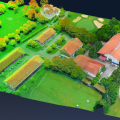.jpg)
A team of researchers at the School of Surveying and Spatial Information Systems at the University of New South Wales (UNSW) in Sydney have been motoring Japan’s first regional navigation satellite, ’Michibiki’.
The satellite is the first of three that will provide Japan – and by proxy, Australia – with more accurate and reliable GPS signals.
It was launched in September and is designed to help satellite navigation in city, urban and mountain areas where existing GNSS systems from Russia and the US have poor coverage.
As further systems are launched by China and the EU, it will also augment their signals.
“What is especially exciting is that Michibiki is the first satellite to transmit a complete set of modernised GPS signals,” said the UNSW team.
“This will allow UNSW researchers access to new signals across three bands that will not appear on GPS satellites until the launch of the next generation of GPS-III satellites, slated for a start in 2014.”
The GPS-compatible signal from the satellite has been regularly acquired and tracked as it appears over Sydney to the west in the evening and fades to the north by late morning.
Doing so will help the researchers understand how it can be harnessed to improve navigation services in Australia.







